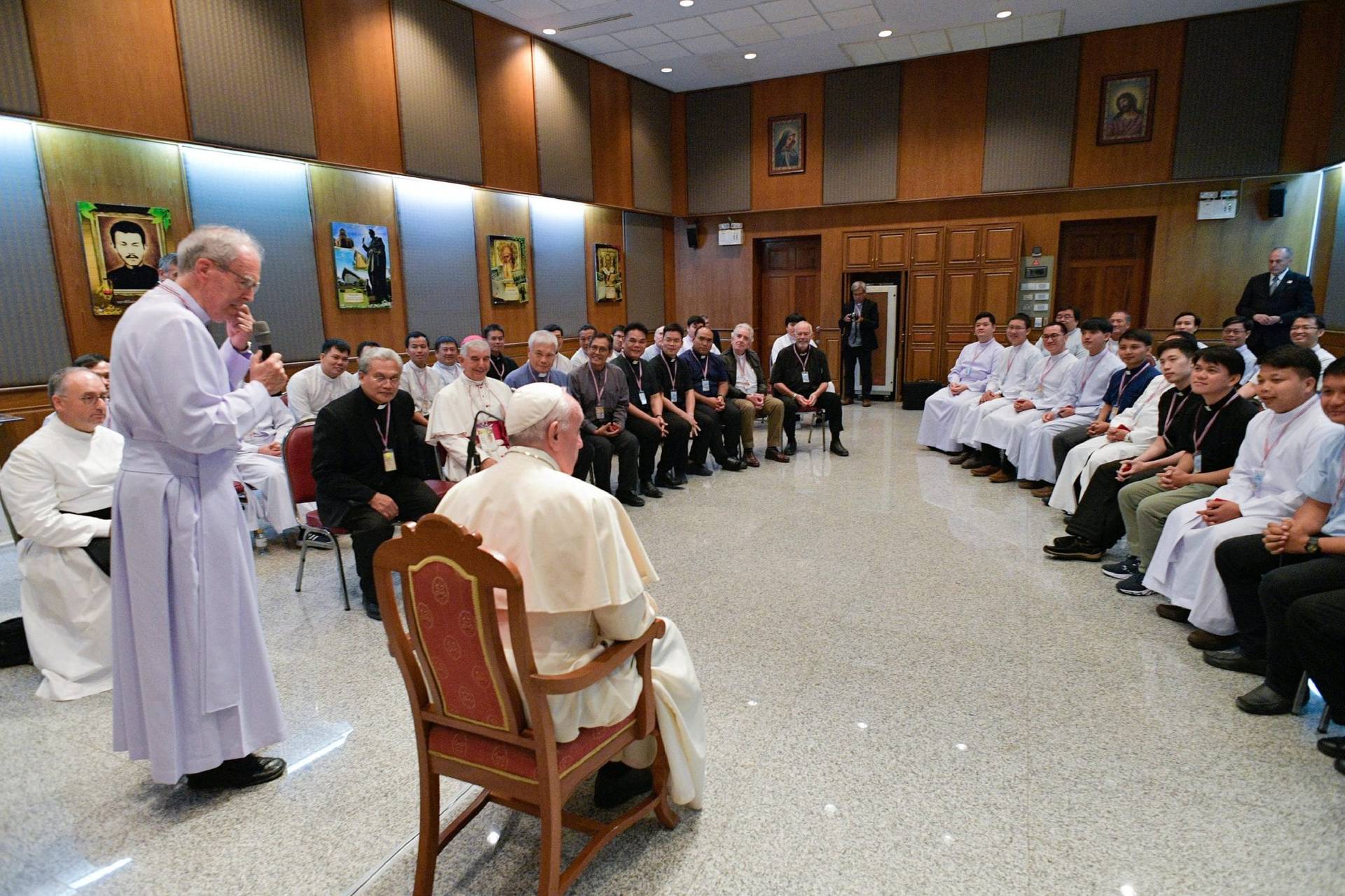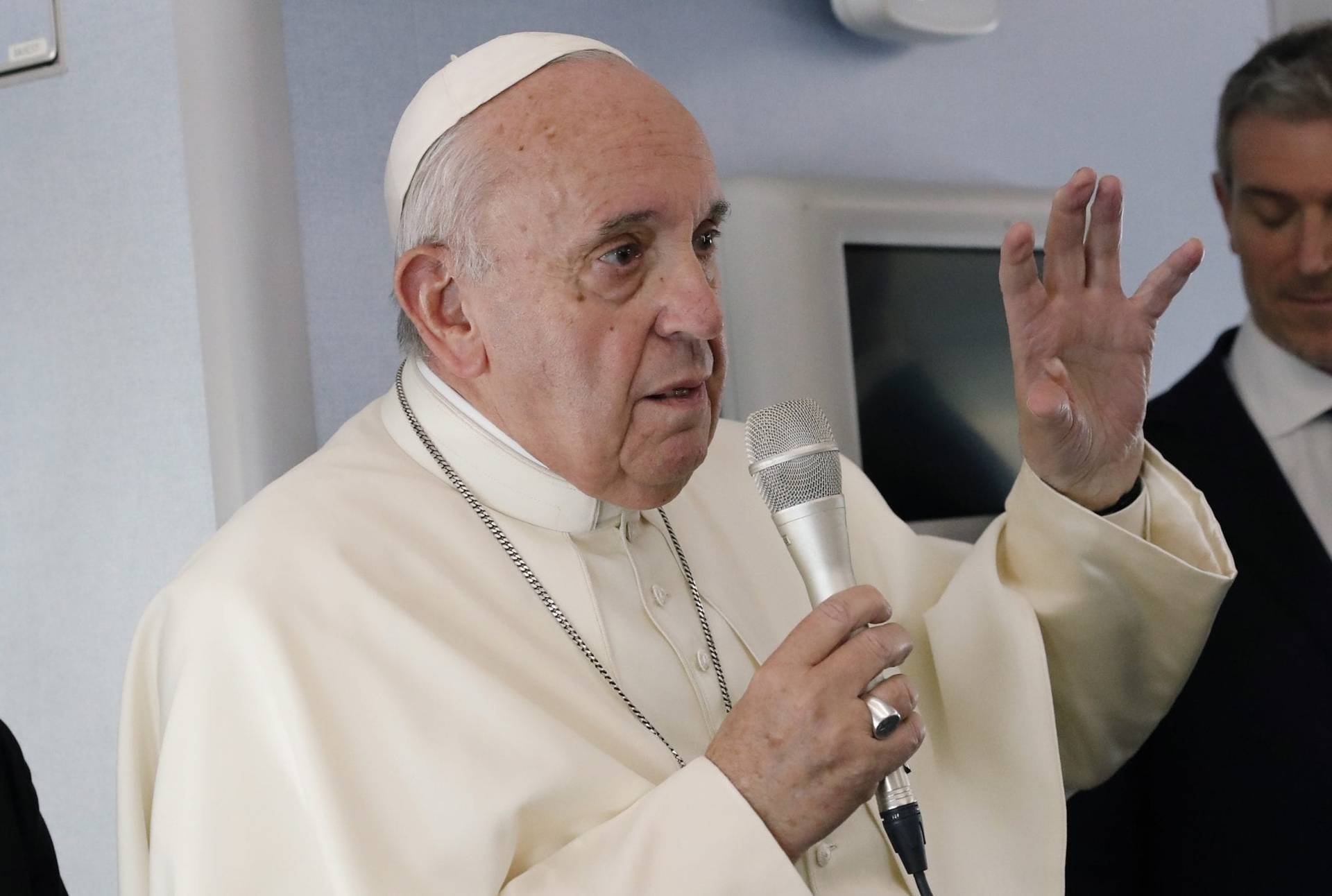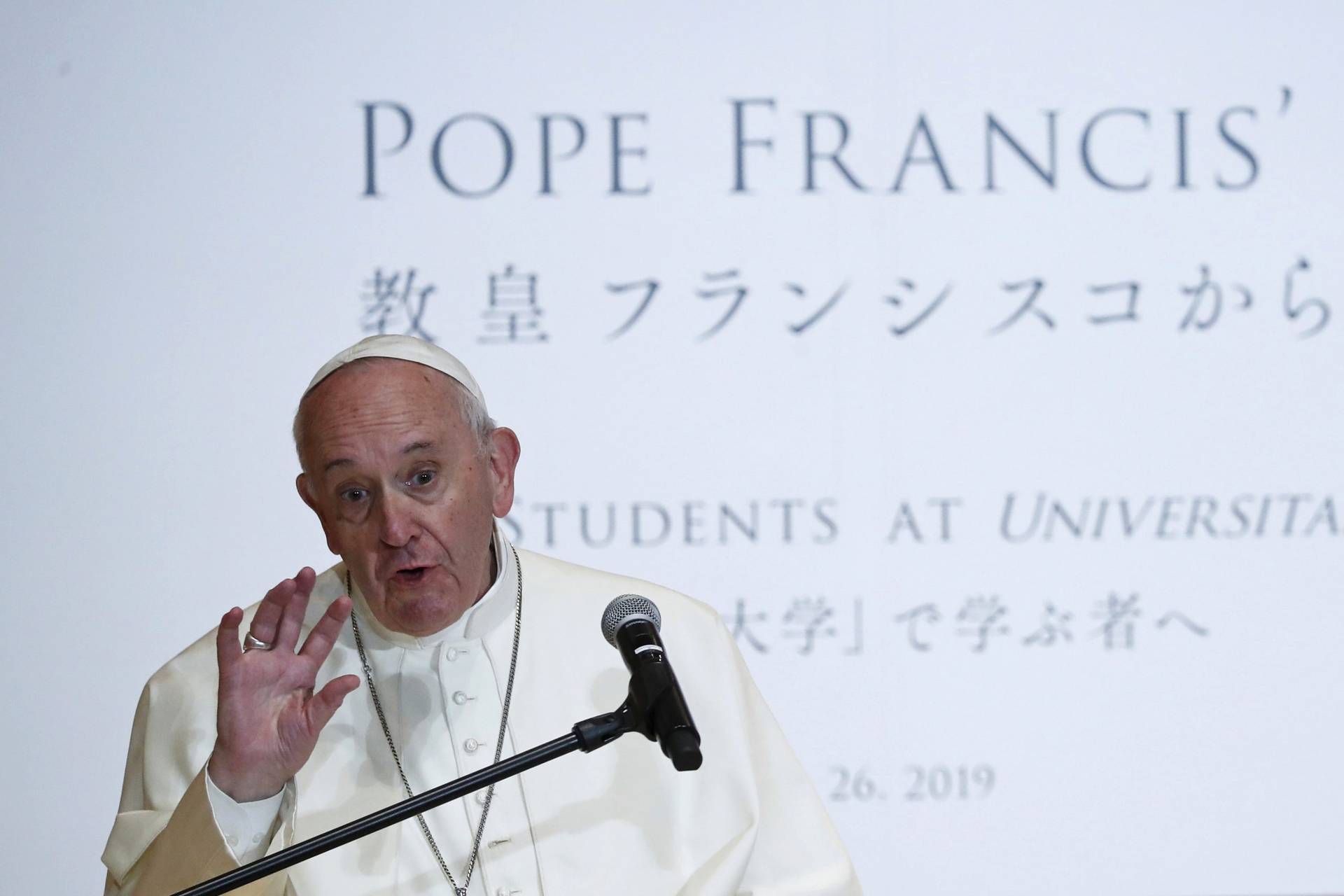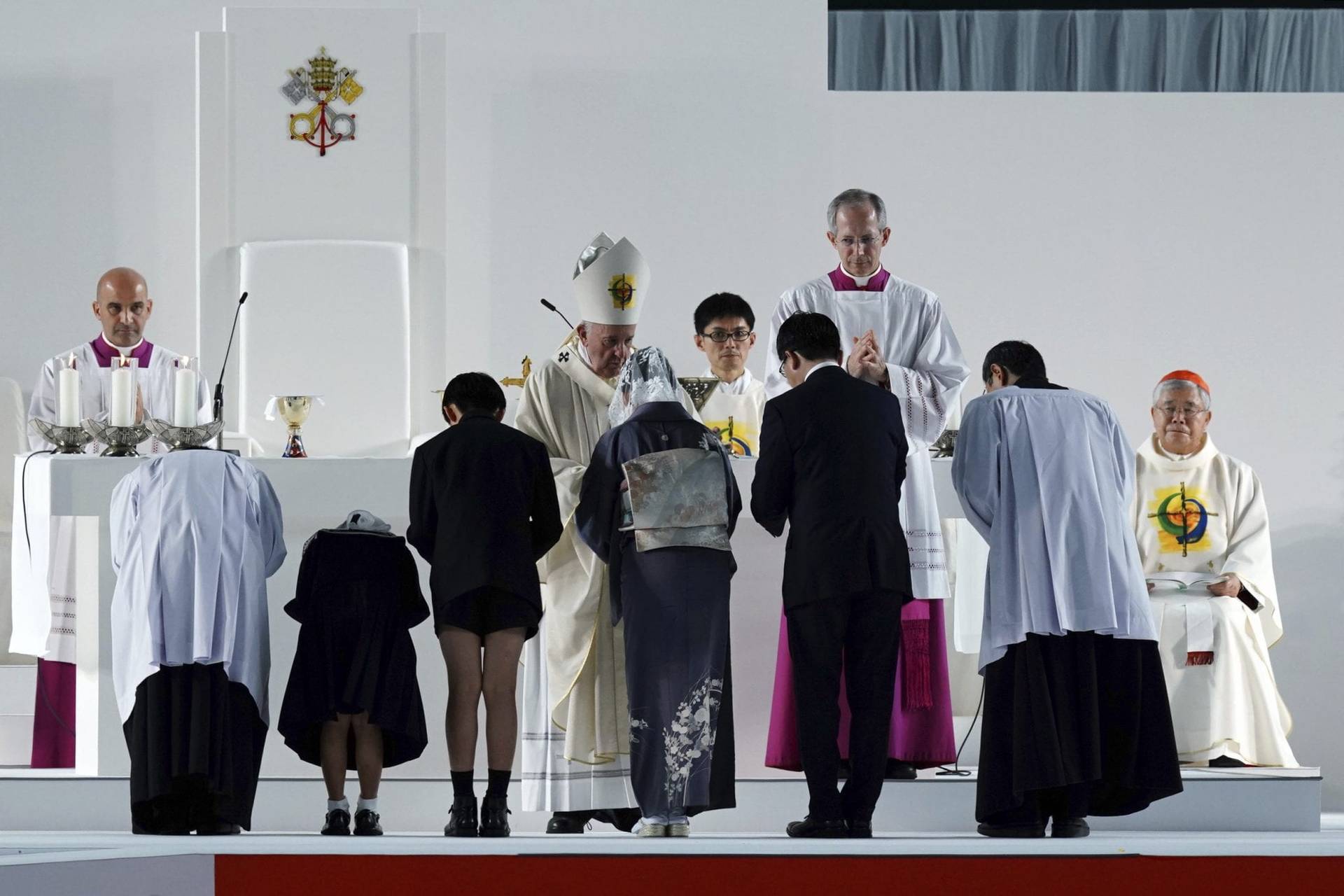HIROSHIMA, Japan — A picture is worth a thousand words which is one reason Pope Francis decided to issue his appeal for a ban on nuclear weapons from the only cities that have been attacked with atomic bombs.
But sometimes, four hundred words are worth more than an image, especially when they describe a “scene of hell.”
On Sunday afternoon in Hiroshima, Francis listened to Yoshiko Kajimoto, who was 14 years old when the United States dropped an atomic bomb on the city in World War II. She was some 1.5 miles from the epicenter of the blast.
She fainted soon after seeing “a blue light” through the window of the factory in which she was working. The entire building collapsed.
“There were people walking side by side like ghosts, people whose whole body was so burnt that I could not tell the difference between men and women, their hair standing on end, their faces swollen to double size, their lips hanging loose, with both hands held out with burnt skin hanging from them,” Kajimoto told the pope. “No one in this world can imagine such a scene of hell.”
“In the following days, white smoke was everywhere: Hiroshima had become a crematorium,” she said. “For a long time, I could not remove the bad smell of cremated people from my body and clothes.”
Both her parents survived the blast, but her father died a year and a half later, due to radiation exposure. Her mother died 20 years afterwards, due to the effects of the bomb. In 1999, Kajimoto had most of her stomach removed due to cancer. Today, at 88, she suffers from cancer.
“Most of my friends have died of cancer,” she said. “I work hard to bear witness that we must not use such terrible atomic bombs again nor let anyone in the world endure such suffering.”
Her words came right before Francis’s “prayer for peace” in the Hiroshima Peace Memorial Park, the epicenter of the blast. It marks a place where, as the pontiff said, “so many dreams and hopes disappeared, leaving behind only shadows and silence.”
In an instant, “everything was devoured by a black hole of destruction and death.”
Upon hearing Kajimoto’s story, it is easy to understand why Francis said he felt a “duty” to come to this place as a pilgrim of peace and stand in silent prayer, “to recall the innocent victims of such violence,” while at the same time carrying in his heart the prayer of those who today long for peace and dedicate their lives to accomplishing it and carrying with himself the “cry of the poor,” who are the most helpless victims of hatred and war.
In this place, he said, he wanted to pay homage to all the victims and “bow” before the strength of those who survived the blast but for years bore in their flesh the “immense suffering, and in their spirit seeds of death that drained their vital energy.”
Francis said that it was his “humble desire” to be the voice of the voiceless, who witness the growing “tensions” of today, such as the inequalities and injustices that “threaten human coexistence,” the inability to care for the environment, and the constant armed conflicts, “as if these could guarantee a future of peace.”
Echoing his message from earlier in the day, the pope said that the use of atomic power for purposes of war is a crime not only against human dignity but also the planet, and that it is “immoral,” as is “the possession” of nuclear weapons, “as I said two years ago.”
RELATED: Pope calls money spent on nukes ‘an affront crying out to heaven’
“We will be judged on this,” he said. “Future generations will rise to condemn our failure if we spoke of peace but did not act to bring it about among the peoples of the earth.”
“How can we speak of peace even as we build terrifying new weapons of war?” he asked. “How can we speak about peace even as we justify illegitimate actions by speeches filled with discrimination and hate?”
A secure society, Francis argued, can only be built if we “let weapons fall from our hands.”
“How can we propose peace if we constantly invoke the threat of nuclear war as a legitimate recourse for the resolution of conflicts?” he asked. “May the abyss of pain endured here remind us of boundaries that must never be crossed.”
“On behalf of all the victims of atomic bombings and experiments, and of all conflicts, let us cry out together: Never again war, never again the clash of arms, never again so much suffering! May peace come in our time and to our world.”
Earlier in the day, Francis said Mass for some 20,000 in Nagasaki’s baseball stadium, where people had waited for several hours under pouring rain that cleared up minutes before the liturgy began.
Most of his homily was about the Gospel reading on Jesus’ crucifixion, but Francis didn’t focus on the death of the Son of God but the “voices” heard around him: From the good thief, who acknowledged him as king, being prophetic; but also those who remained silent or jeered at Christ.
Today, too, humanity can choose to remain silent and jeer, or bear prophetic witness to a “kingdom of truth and justice, of holiness and grace, of love and peace,” the pope said.
“Nagasaki bears in its soul a wound difficult to heal, a scar born of the incomprehensible suffering endured by so many innocent victims of wars past and those of the present, when a third world war is being waged piecemeal,” Francis said. “Let us lift our voices here and pray together for all those who even now are suffering in their flesh from this sin that cries out to heaven.”
Francis was scheduled to head back to Tokyo on Sunday evening, where on Monday he will meet with the victims of the “triple disaster” – the 2011 earthquake, tsunami and Fukushima nuclear incident which killed more than 15,000 people – and with local Japanese authorities.
On Tuesday, he will have a closed-door meeting with the local Jesuit community, before heading back to Rome. During the 14-hour flight he is expected to answer questions from the journalists traveling with him on the plane.
Follow Inés San Martín on Twitter: @inesanma
Crux is dedicated to smart, wired and independent reporting on the Vatican and worldwide Catholic Church. That kind of reporting doesn’t come cheap, and we need your support. You can help Crux by giving a small amount monthly, or with a onetime gift. Please remember, Crux is a for-profit organization, so contributions are not tax-deductible.

















